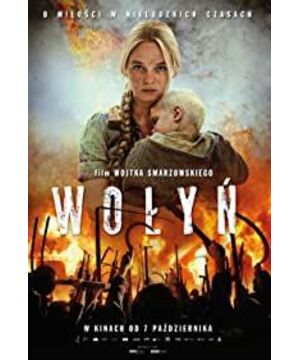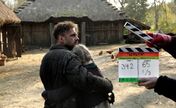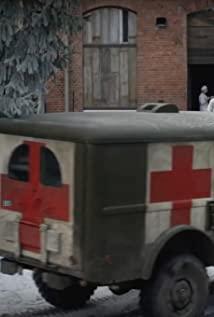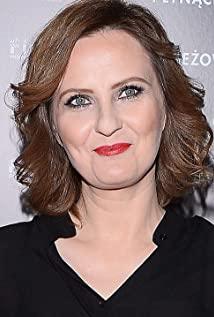After watching "Warren" at night, I couldn't calm down for a long time.
The bloody scenes, brutal slaughter, incitement of hatred, burning, killing and looting again and again, as well as the struggle and distortion of human nature... make people extremely depressed, extremely sad, and extremely sad!
Rarely watch war movies, and it is the first time of this type. War is a cautionary tale, and the use of film to document historical events is a marvelous thing. A tribute to director Vojisic Smarzowski!
01
All good hopes will be disillusioned one by one
The background of the film is a series of tragic events in the war-torn Volren region of northwestern Ukraine at the beginning of World War II and from 1939 to 1943 after that, especially the Ukrainian nationalists after the Soviet Union and Germany have "nothing to do with the Poles". The Holocaust of Difference" is the most.
The Warren area was originally an ethnic gathering area, where Ukrainians, Poles and Jews lived. Before the war, even though there were historical racial, religious, and political conflicts, as ordinary people, people could live and intermarry together, and children could play happily together, and it did not make people think of "hatred"!
The movie also begins with the wedding of a Polish girl whose sweetheart is a Ukrainian youth. The bride's sister, Sophia, the protagonist of the film, also fell in love with a Ukrainian young man Petro. At the beginning of the movie, the wedding event is depicted in a larger space, but it always makes people feel that there is a weird atmosphere in it. After watching the whole drama, I couldn't come back to my senses for a long time. After calming down and looking back, I found that it turned out that the atmosphere of ethnic conflict ran through from the beginning to the end. A lot of people's good hopes for life are contained in this wedding, but the subsequent series of events will crush, tear, and destroy all people's good expectations one by one!
The song, dance and vodka at the beginning made me have a prejudice: the people who are willing to use dance and alcohol to express their "inner" have a natural "simple and simple", but at the same time they are prone to impulse in temperament and lack of wisdom in struggle. We also know that generalized impressions are always biased - but it makes people's "cognition" easier, so we always enjoy it. There are also many "struggles" in singing and dancing. There are many scenes of three children running, young people fighting with farm implements, burning stakes at the party, braids cut off by an axe on the bride’s threshold, and priests bitten by wolves... After watching the whole film, I found that there are "Foreshadowing" of hatred. The children were separated because of the Ukrainian, Polish and Jewish races, the youth had to "kill each other" because of ethnic hatred, the burning stakes turned into burning "Polish children", the bride's hair was cut off After being decapitated, the priest was bitten by a wolf and bleed but survived. Sophia, who was covered in blood, brought her two-year-old child to survive when the wolf passed by?
The movie has experienced all the cruelty of the war from Sophia's perspective. Her pursuit of love and yearning for life are also hurt more because of her "strength" in this context. Living seems to be an extremely difficult thing; the pursuit of beauty has nothing to do with the "hell on earth" under racial hatred! Her favorite Ukrainian youth, Petro, was shot in the head that night because she stole a box of vodka from the Soviets and bribed the transport officer who distributed the prisoners to save her; The Germans survived the blitzkrieg of Poland, and escaped again after being handed out by the Soviets. After returning, because she thought "they (Ukrainians) all knew me", she went to the town to buy goods and was beheaded by an axe; she later fell in love with her Anthony Wilk, a young Polish youth who appears to be a progressive member of the Polish government-in-exile, also failed to get to her side in time for the nationalist slaughter. Although she escaped after experiencing a nightmare massacre, she was described as a dead body. After many twists and turns, she found her sister, and then experienced her brother-in-law killing her own brother, and then her brother-in-law and sister's family were killed again. Slaughter... The director didn't want "cruel" to stop at all!
"Evil" seems to be a bottomless abyss, there is no such thing as "extremely evil", there is only one "comparative level" that makes people unable to make a sound! Is there still beauty in the world? The ending of the movie seems to be "open", or it's just that the director doesn't want to or can't bear to make his own interpretation. After so much brutality, everyone may have their own answers in their hearts.
02
"Animals don't torture people"
When Skiba escaped from the distribution of the Soviets, their priest was also brutally murdered and thrown into the river. People fished up the body and couldn't help but say:
"They are simply beasts, not people!"
"Animals don't torture people."
Skiba received such a sentence, which is very revealing of human nature! Another name for "Warren" is "Hate." The power of hatred and revenge can often make people's "intelligence" very terrifying and can show the darkest side of human nature. Animals do not have the intelligence of humans, how can they be compared with humans in their realistic destructive power, psychological trauma, and long-term influence? So "animals don't torture people", the hidden half sentence is obviously "people will"!
Regardless of the background of World War II or the control of the Soviet Union, they are actually just a foil for "extreme nationalism". At least the film "Warren" mainly accuses the "harm" caused by ethnic hatred. This "injury" can linger over time and affect the lives of generations. Those cruel scenes, the fears of those experiences, the shock of the evidence, the wounded souls... all have a "torture" power that penetrates time and space.
At the beginning of the film, the pastor's remarks at the wedding at the beginning feel very "out of place":
"Beware of the false prophet, who comes to you in sheep's clothing and is actually a brutal wolf. He doesn't talk about the kingdom of God, they only talk about the kingdom of Ukraine. What are the consequences? Destruction everywhere, even killing Poles. Poland and Ukraine, there is no brotherly love. I appeal to all Orthodox Christians to gather here, let us love each other with the same faith! God is happy to witness today's wedding, Hela Grovsky and Vasil Huga, who are A shining spark that adds new color to the friendship of generations..."
It was later discovered that this was actually very "timely". The subsequent "religious" promotion of incitement to extreme nationalism is really sinful:
"All peoples are brothers, everyone has the right to live, and the goal is to make the people happy. But this is not allowed and brings no benefit. It separates happiness from justice and the world becomes moderate and excessive . One's own nation, one's own motherland, such dedication can be affirmed. But the power of hatred must be applied to other nations and countries..."
"...we need rivers of blood, with Polish blood! Because Ukraine must become pure, the same water in a cup! In the name of the Father, the Son, the Holy Spirit..."
Of course, the ultra-nationalists themselves use the slogan of "freedom and liberation" to give themselves a high-sounding reason. After watching it, people who live in a peaceful life can't help but wonder: Can ethnic conflicts "find a reason" to carry out atrocities? Can you burn, kill, loot, hack and axe? Even pregnant women and young children are not spared? Not to mention the horrific "torture" of gouging out eyes, peeling skins, and chopping off any part of the body! Why are people so easily incited? Will we also make such a choice in the middle of it? Those cruel scenes are simply frightening! Many people say that the second half is a horror movie, and it really takes "courage" to watch it!
But at the same time, we can also see in the film that the "agitation" of the group does not completely affect the "good thoughts" of the individual. Many places in the film show that when "extreme nationalism" comes, there are always people out of instinctive "kindness" to help. These spark-like "kindness" may be the hope of human nature?
03
The madness of the group vs the loss of the individual
At the wedding, a man named Bohdan from Lviv was introduced as an intellectual leader, and from the beginning of his appearance, he began to play up the contradiction between Poland and Ukraine, and said at the dinner that "Hitler can help They built an independent Ukraine" and asked Ukrainian youth to support Hitler. The recurring "half" Ukrainian Suma (his mother is Polish) is also a very good character, who welcomes the arrival of the Soviet troops, and pledges allegiance to the Germans... not putting them at all in the face of these In the eyes of the powerful army, they wantonly expropriate and racially cleanse their land. They are all indifferent and even help the tyrants. Their reasons are all "for the Ukrainian nation and country"! It can also be seen that they will slaughter and exterminate the Poles because of "extreme nationalism"!
Those so-called "readers", the so-called "knowledge of current affairs", as well as religious demagogues and ultra-nationalists, the atrocities carried out by the Ukrainians they led are reminiscent of the crowds described in "The Crowd"! War, poverty, and backwardness will always make education backward, which in turn affects the quality of a country or region's population. War is a collective activity in which individuals may be coerced. I believe that even today, people in war-torn areas are still instigated, threatened, deceived, and seduced to fight for the so-called "justice", "freedom", "resist oppression", "strive for independence"... Make efforts to "resist" and carry out arbitrary atrocities! But justice, freedom, resistance to oppression, and independence are not just loud slogans chanted by groups, not just violent incitement by "leaders". People in the group probably only have emotional selves, so they will not make more rational choices; maybe some people realize that "this is not good", but the reality makes them unable to speak and choose - "conscience" will eventually call These people became witnesses to history!
In the opening wedding, Bohdan said to the other young people: "Pilaki, have you heard of this name? ... You should read more books, and then you can tell your children"! As Ukrainian ultranationalism mounts a massacre, an officer of the Polish government-in-exile meets with a general of the Ukrainian National Insurgent Army, who says "I read your poems" before saying "Glory belongs to the free Ukrainians" The former was brutally dismembered with horses for this reason. Does reading really make you feel more compassionate? Does reading lead to universal justice? Of course, not all religions! Individuals are lost in the great shadow of war.
Perhaps the important cautionary significance of war is to let us recognize the powerful destructive power brought about by war: it not only blows up villages, wastes fields, and slaughtering innocent people, but more importantly, it destroys order, annihilates humanity, Warp the mind and bring "damage" through time and space. Therefore, in times of peace, people in peace need to be vigilant about this; they also need to improve their judgment on the values pursued by individuals and society, such as freedom, justice, and independence!
This movie makes people feel uncomfortable in retrospect... I hope, there really is a vast and peaceful life in the distance!
View more about Hatred reviews











